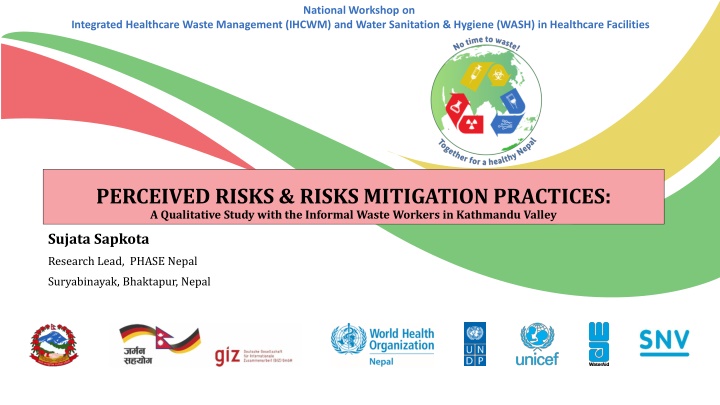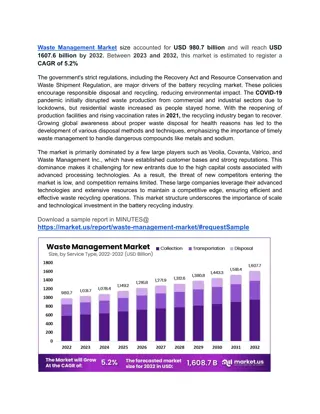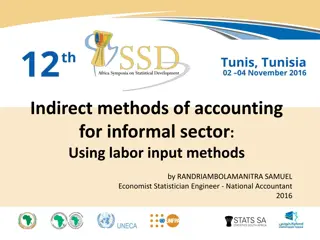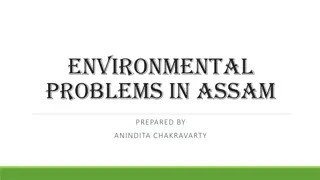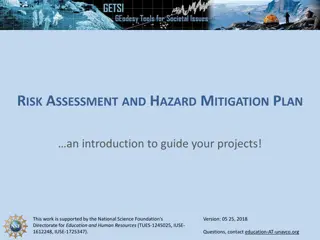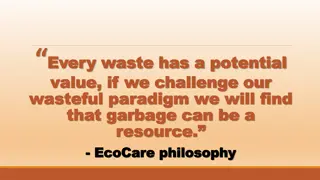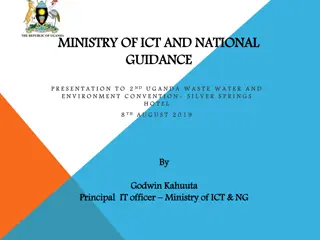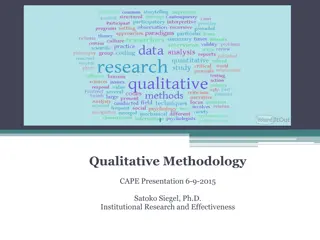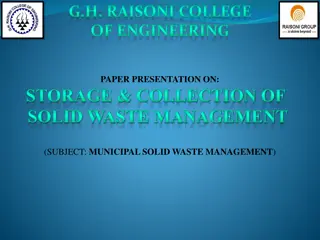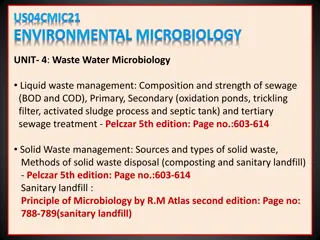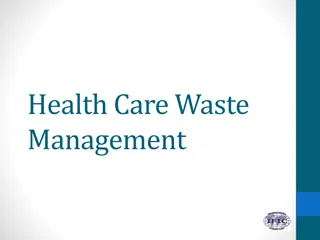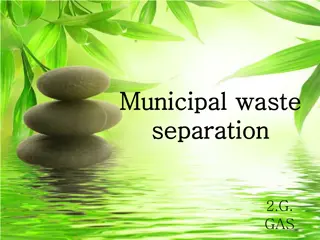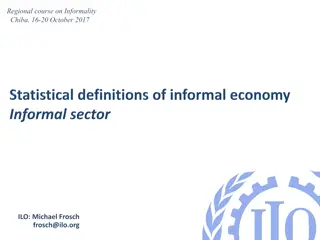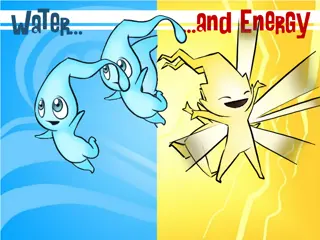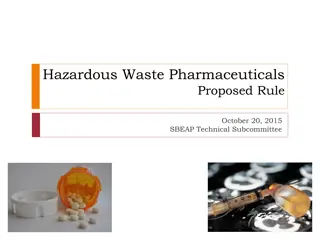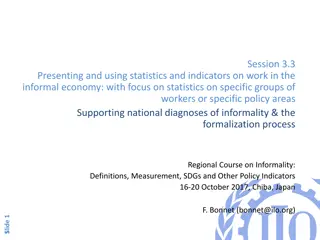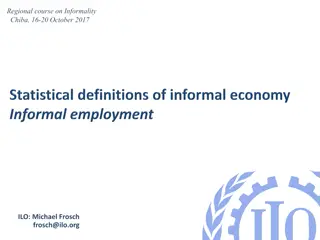Perceived Risks and Risks Mitigation Practices in Informal Waste Workers: A Qualitative Study
A qualitative study conducted in Kathmandu Valley exploring the perceived risks and mitigation practices of informal waste workers. The research project, led by Sujata Sapkota, aims to address the occupational and health challenges faced by these workers. The study includes a mix of quantitative and qualitative research methodologies, focusing on the lack of epidemiological data on informal waste workers and their exposure to risky behaviors. Recommendations are provided based on the findings to improve the health and well-being of waste workers.
Download Presentation

Please find below an Image/Link to download the presentation.
The content on the website is provided AS IS for your information and personal use only. It may not be sold, licensed, or shared on other websites without obtaining consent from the author.If you encounter any issues during the download, it is possible that the publisher has removed the file from their server.
You are allowed to download the files provided on this website for personal or commercial use, subject to the condition that they are used lawfully. All files are the property of their respective owners.
The content on the website is provided AS IS for your information and personal use only. It may not be sold, licensed, or shared on other websites without obtaining consent from the author.
E N D
Presentation Transcript
National Workshop on Integrated Healthcare Waste Management (IHCWM) and Water Sanitation & Hygiene (WASH) in Healthcare Facilities PERCEIVED RISKS & RISKS MITIGATION PRACTICES: A Qualitative Study with the Informal Waste Workers in Kathmandu Valley Sujata Sapkota Research Lead, PHASE Nepal Suryabinayak, Bhaktapur, Nepal
Perceived risks and risks mitigation practices: qualitative study in informal waste workers- Sujata Sapkota 12/12/019 2
Team PHASE Nepal: Jiban Karki, Sujata Sapkota, Gerda Pohl, Yuba Raj Baral, Prabina Makai, Saraswati Adhikari School of Health and Related Research, The University of Sheffield: Andrew CK Lee, Michelle Black M decins du Monde: Nita Chaudhari, Guillame Fauvel, Astrid Fossier-Heckmen Perceived risks and risks mitigation practices: qualitative study in informal waste workers- Sujata Sapkota 12/12/019 3
Presentation Outline Project Background Quantitative study Qualitative Study- background and aims Findings Recommendations Perceived risks and risks mitigation practices: qualitative study in informal waste workers- Sujata Sapkota 12/12/019 4
Background Project : Healthy Waste Workers in Kathmandu Valley M decins du monde/ PHASE Nepal Need for research: Lack of epidemiological data on IWWs Facing significant occupational & health risks Dependent on insufficient earnings & low socio-economic status Involved in risky behaviors/exposure PHASE Nepal/ The University of Sheffield/ Medicines du Monde Mixed-Method: Quantitative, followed by, Qualitative research Ethical Approval: Nepal Health Research Council (Reg. No. 388/217) Perceived risks and risks mitigation practices: qualitative study in informal waste workers- Sujata Sapkota 12/12/019 5
Quantitative Research Cross-sectional survey 1278 Informal Waste Workers (IWWs) were interviewed [mid-November 2017 to mid- December 2017] Site: Shantinagar and Teku in Kathmandu Valley & Sisdole in Nuwakot A range of issue were studied: Knowledge of health risks related to waste-work Personal protection Analysis of PPE Use Analysis of Risk perceptions General Health Tobacco, drugs and alcohol Healthcare access and utilization Heart-mind problems/ depressive level Sexual & Reproductive Health Disability Social Security Employment and Financial Situation 12/12/2019 6 Perceived risks and risks mitigation practices: qualitative study in informal waste workers- Sujata Sapkota
Qualitative Research AIM: To explore the perceptions of risks and risks mitigation strategies in waste workers in Nepal OBJECTIVES: To explore waste-workers understandings and attitudes of their occupational health risks what factors influence waste workers behaviors towards using personal protective equipment in their work what factors would lead to change in in behavior in relation to protecting themselves from health risks in their work IWWs alcohol and tobacco consumption practices waste workers health seeking behavior and their perceptions of attitudes of healthcare providers towards IWWs Perceived risks and risks mitigation practices: qualitative study in informal waste workers- Sujata/PHASE Nepal 12/12/019 7
Methods Sites// Participant Selection Shantinagar, Teku and Sisdole// Convenience/ Snow-ball Data collection Face to face In-depth Interviews: 18 IWWs interviewed (13 Male/ 5 Female) Focused Group Discussions: 4 FGDs (1 Nepali group: 11; 1 female-only group: 9; 2 mixed-sex groups: 15 & 14) Data and Analysis Audio-recorded, Transcribed Verbatim, Translated and Thematically analyzed 12/12/019 8 Perceived risks and risks mitigation practices: qualitative study in informal waste workers- Sujata Sapkota
Themes Sub-themes 1 IWWs involvement in waste-work 1. Reasons for involvement in waste-work 2. Nature of work performed 2 Risks associated with waste-work: perceptions & experiences 1. Discrimination 2. Health Risks 3 Risk mitigation strategies: perceptions and practices 1. Stay away/ Be careful 2. Use of protection/ PPE 3. Self-care/ health-care 4 Barriers to PPE use 1. Inconvenience 2. Unaffordable 3. Not a norm/ Habit 4. Perceptions that PPE is not necessary Findings: 5 Strategies to promote safety and reduce risks 1. Strategies to promote the use of PPE 2. Other strategies/ mechanisms to promote safety 6 7 8 9 Hygiene and sanitation practice Tobacco use & alcohol consumption Mental Health Support System 12/12/019 9
IWWs involvement in waste-work Reasons for involvement in waste-work Negative Drivers Illiteracy Perceived lack of skills Lack of qualifications to perform other jobs Unemployment Poverty Nature of work performed: Collecting wastes Sorting wastes whatever was asked of them Positive Drivers Money earned Low-barriers to entry Better climatic and work conditions (compared to India) Having a family member or friend engaged in waste work Flexible nature Freedom Perceived risks and risks mitigation practices: qualitative study in informal waste workers- Sujata/PHASE Nepal 12/12/019 10
Risks associated with waste-work DISCRIMINATION Some people scold [us] and behave badly. some people use offensive language; some people cheat; some people scold, scrap dealers also shout at me. I feel bad when people behave in that way, that really hurts. It is the saddest part. This is not a trivial work. . Everyone dominate us saying we work with waste. Old people who do not understand are disrespectful. They think that I cheat them. . What to say relatives also look down on me. They drink and scold me saying that I am doing an awful job. While walking people use vulgar words to scold me and say that I should be cheated and beaten. (I3, M) This is a very risky job if someone steals something and I am on the way, people catch me and blame me. They slap me as well. They take me into police custody. They ask for money. (I5, M) 12/11/2019 11
If I share this with my relative or villagers they will hate us saying you are working in waste. They said you did not get any other job in the Kathmandu how you can do work in that waste there is bad smell even we don t say that we work in the waste in our children s school. If we share this in the school, teachers, parents and our children s friends will look at our children in a different way. We never talk openly about our job due to discrimination in the society. In the early days of my work in the field if people knew that you are working in waste it is very difficult to get a room in Kathmandu. My children go to private boarding school but I never tell my children s teacher that I am working in waste due to shame and discrimination in the society. If other people hear what I am saying they will treat my children in a different way. (FGD4, P8, F) Perceived risks and risks mitigation practices: qualitative study in informal waste workers- Sujata/PHASE Nepal 12/12/019 12
HEALTH RISKS Injuries cuts/ pricks/ needle-stick injury/ metals Road Traffic Accidents Physical Injuries resulting from vehicles and machines Injuries from machines, dozers and vehicles: Sisdole Dog-bites Ergonomic hazards: back-ache Health issues commonly experienced: cough, headache, body-ache, fever and chest issues; dog bites Perceived risks and risks mitigation practices: qualitative study in informal waste workers- Sujata/PHASE Nepal 12/12/019 13
Risk mitigation strategies Stay Away / Being Careful I have to accept such kind of behaviours since I come to a different place. I don t do anything, I just work. I am here not for a fight. There is no place to complain about it. I keep myself silent and walk like nothing has happened, to continue my work, collect the waste and come to the scrap dealer. That s it. (I3, M) If there are dogs, I have to keep a distance. If there is glass, I have to be careful. Then, I should not go near drunkards I have to pick waste carefully and slowly . If I see that someone stole things, I shouldn t go to that side. (I5, M) Perceived risks and risks mitigation practices: qualitative study in informal waste workers- Sujata/PHASE Nepal 12/12/2019 14
Use of protection/ personal protective equipment Protection meant different things: protective equipment (the PPE) , wearing regular shoes/ clothes , piece of clothes wrapped around mouth and nose I use a glove on one hand, right hand. I don t wear that on the left hand. . I wear a mask. I use a handkerchief. Then, I use a cap to stay away from the sun. And then uniform and shoes. I wear shoes to keep my feet safe - Normal shoes. I search herein the waste and wear them. .I don t pick with the left hand. I carry a sack with one hand. (I16, M) PPE: Gloves, Masks commonly used Used selectively Seasonal Variation Clothes/ Gloves found in waste 12/12/019 15
Self-care/ healthcare Tetanus toxoid vaccination I go to the hospital for vaccination after being injured or cut or pricked (FGD1, P7, M) Self-care for minor ailments Healthcare for major ailments, Vaccination services I (get vaccinated) every six months to be safe (FGD1, P1, M) I never took TT vaccination. I am scared to take TT (FGD1, P3, M) IWWs choice of health facilities was influenced by three common factors, namely, waiting times, their accessibility and costs. Perceived risks and risks mitigation practices: qualitative study in informal waste workers- Sujata/PHASE Nepal 12/12/019 16
Barriers to PPE use Inconvenience It will difficult to speak. [We] have to shout as part of our work, saying, Tina (steel), falam (iron), bottle and papers . At that time, it is difficult to shout if you wear a mask (I2, M) It was difficult to wear (gloves) as they were heavy with rain. When I tried to pick waste, it slipped from my hands and slowed my work slow and sometimes (it was) difficult to work. After wearing (it) for two, four days, it ripped and I threw it away. (I3, M) Unaffordable I do not have money to buy shoes and gloves for daily use because they are expensive. If you buy a pair of shoes, it costs two to four hundred (Rupees) or even more. I do not even earn one hundred rupees some days. It is hard to buy a pair of shoes that costs four hundred rupees, and gloves as well. (I1, M) Perceived risks and risks mitigation practices: qualitative study in informal waste workers- Sujata/PHASE Nepal 12/12/019 17
Barriers We didn t use it from the beginning and nobody uses it. So, how do I use them? (I14, M) Not a norm/ habit If I use these things then the scrap dealer would say that I am a rich person so they don t buy my scrap things. So I don t use it. (I15, M) There is no use of eye glasses. If I use glasses my owner say that I am a big person. They mock me! (I2, M) Perceptions that PPE are not always necessary People think it is ok (not to use PPE at all times.) why we need to wear them and they are used to work in that situation. (FGD2, P1, M) For example, when we collect old papers or paper boards, we don t need to put on gloves. (FGD2, P7, M) I have not used because I don t need to wear them as I work in the scrap dealer and I feel comfortable working without wearing them. I don t collect wastes. Waste collectors bring wastes and they have already sorted them. I just arrange the waste, weigh and sell them to the customers. (I7, M) 12/11/2019 18
Strategies to promote safety and reduce risks Strategies to promote use of PPE PPE that is comfortable to wear and use Alternative equipment to make waste-work more efficient Making use of PPE a norm, increase availability Other strategies to promote general safety Provision of education to promote awareness and its implementation Safety issues in Sisdole, traffic management Waste-segregation at the point of collection/household waste segregation Rules and regulations to promote safety Perceived risks and risks mitigation practices: qualitative study in informal waste workers- Sujata/PHASE Nepal 12/12/019 19
Recommendations: Firm steps to combat the discrimination aimed at IWWs, as well as strategies to address the societal stigma associated with waste-work. Programs and policies to establish PPE use as a regular health and safety practice amongst waste workers. Activities to increase IWWs awareness of the importance of health promotion and disease prevention; improved access to preventive healthcare services for the IWWs; and first aid trainings, trainings on stretching exercises to combat ergonomic hazards. Health education to the waste-workers, particularly focusing on vaccinations and effective self-care measures. Perceived risks and risks mitigation practices: qualitative study in informal waste workers- Sujata/PHASE Nepal 12/12/019 20
Recommendations Exploration of alternative measures (in addition to conventional PPE) to aid day-to-day waste-work. Making waste-management better organized especially through the collective efforts of the wider community, for example, Household waste segregation Implementing specific and strict provisions to separate and dispose medical and other hazardous wastes from municipal waste. Introduction and implementation of work site safety rules and regulations. Perceived risks and risks mitigation practices: qualitative study in informal waste workers- Sujata/PHASE Nepal 12/12/019 21
Thank you. 22
